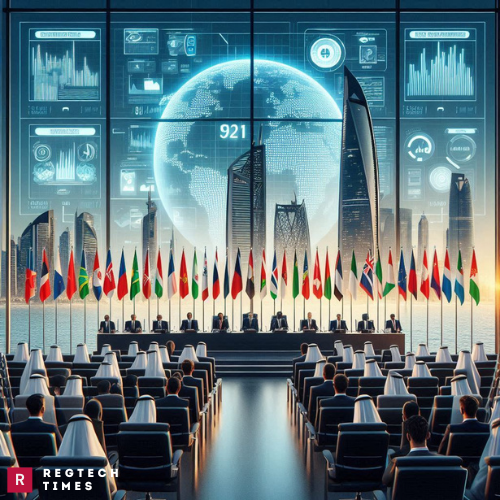Financial crime is a pervasive global threat, one that demands collective international effort to effectively address. The United Arab Emirates (UAE) is emerging as a vital player in the global fight against money laundering, terrorism financing, and other forms of illicit financial activity. A testament to this role is the hosting of the Asia/Pacific Group on Money Laundering (APG) Annual Meeting in Abu Dhabi—the first time this significant gathering has been held in the MENA (Middle East and North Africa) region.
The APG is one of nine regional bodies that comprise the Financial Action Task Force (FATF) network, the foremost international organization focused on fighting financial crime. Although the UAE is geographically outside the APG’s core region, the decision to host the meeting here is a recognition of the country’s growing influence in combating financial crime. This event signifies the UAE’s unwavering commitment to global security and its role as a trusted partner in international financial crime enforcement.
The UAE’s Leadership in Fighting Financial Crime
In recent years, the UAE has taken significant steps to enhance its anti-money laundering (AML) and counter-terrorism financing (CFT) framework. The nation has established itself as a regional leader in transparency and international cooperation. Over the past few years, the UAE has signed 45 international legal assistance agreements, strengthening its network of partnerships with key global players. This expansion of its cooperative framework highlights the UAE’s commitment to fighting financial crime not just within its borders but globally.
Moreover, the UAE’s efforts have yielded concrete results. In 2022, the country successfully extradited 109 wanted criminals, nearly doubling that figure in 2023 with 214 extraditions. The UAE’s collaborative approach to information sharing has also bolstered national investigations into money laundering, leading to significant asset recoveries. In the first half of 2024 alone, Dh3.5 billion ($952.9 million) was recovered, up from Dh2.34 billion in 2023.
Cross-Regional Cooperation: A Necessity in the Fight Against Financial Crime
The rapid pace of technological innovation, combined with the international nature of financial networks, has made the fight against financial crime more challenging than ever. Criminal networks exploit weak points wherever they find them, operating across borders with increasing sophistication. The United Arab Emirates has recognized that the fight against financial crime cannot be confined to national borders. It requires strong, coordinated efforts among nations.
Money Laundering Probe: Saifuzzaman Chowdhury’s $675 Million Real Estate Empire
This is why the UAE’s collaborative initiatives with countries like India, Bangladesh, and Nepal are so significant. These countries, with large remittance flows passing through the UAE, have worked closely with UAE authorities to monitor and track suspicious remittance-related cash payments. The ability of such diverse nations to unite in addressing common challenges speaks to the necessity of cross-regional collaboration in tackling global financial crime.
By hosting the APG Annual Meeting, the UAE not only highlights the importance of such cooperation but also opens the door for deeper partnerships with countries from other regions. The meeting itself will see technical discussions on a wide range of topics, from the latest financial crime trends to capacity building for enforcement agencies. Perhaps most importantly, the informal conversations between delegates from different countries will foster innovative solutions and facilitate the sharing of best practices.
A Stronger AML/CFT Framework for the Future
The United Arab Emirates leadership in financial crime enforcement is not just about past successes; it is about its forward-looking vision. The nation recently launched a new National Strategy for 2024-2027, which focuses on streamlining and centralizing operations to make its AML/CFT framework more effective. A Higher Committee, overseen by the expanded National Committee, will guide this effort, with the former Executive Office of Anti-Money Laundering and Counter Terrorism Financing now serving as the General Secretariat. The UAE is also preparing to release its latest National Risk Assessment, conducted in collaboration with the World Bank Group, which will provide a comprehensive view of the country’s vulnerabilities and risks.
The UAE as a Global Standard-Bearer
Hosting the APG meeting is more than just a prestigious moment for the UAE; it reflects the nation’s readiness to lead the fight against financial crime on a global scale. The UAE’s expertise in handling issues like virtual assets, beneficial ownership, and public-private partnerships has positioned it as a thought leader in the space. By sharing its experiences and best practices with international partners, the United Arab Emirates is helping to raise the global standard for financial crime enforcement.
As financial crime continues to evolve, the leadership of the United Arab Emirates in this arena serves as an example for other nations to follow. Through partnerships, enhanced legal frameworks, and international cooperation, the UAE is proving that it is not just committed to safeguarding its own financial system but is also dedicated to protecting the global financial order. The significance of the APG meeting in Abu Dhabi cannot be overstated; it is a clear indication that the UAE is stepping up as a key player in the international effort to combat financial crime.


